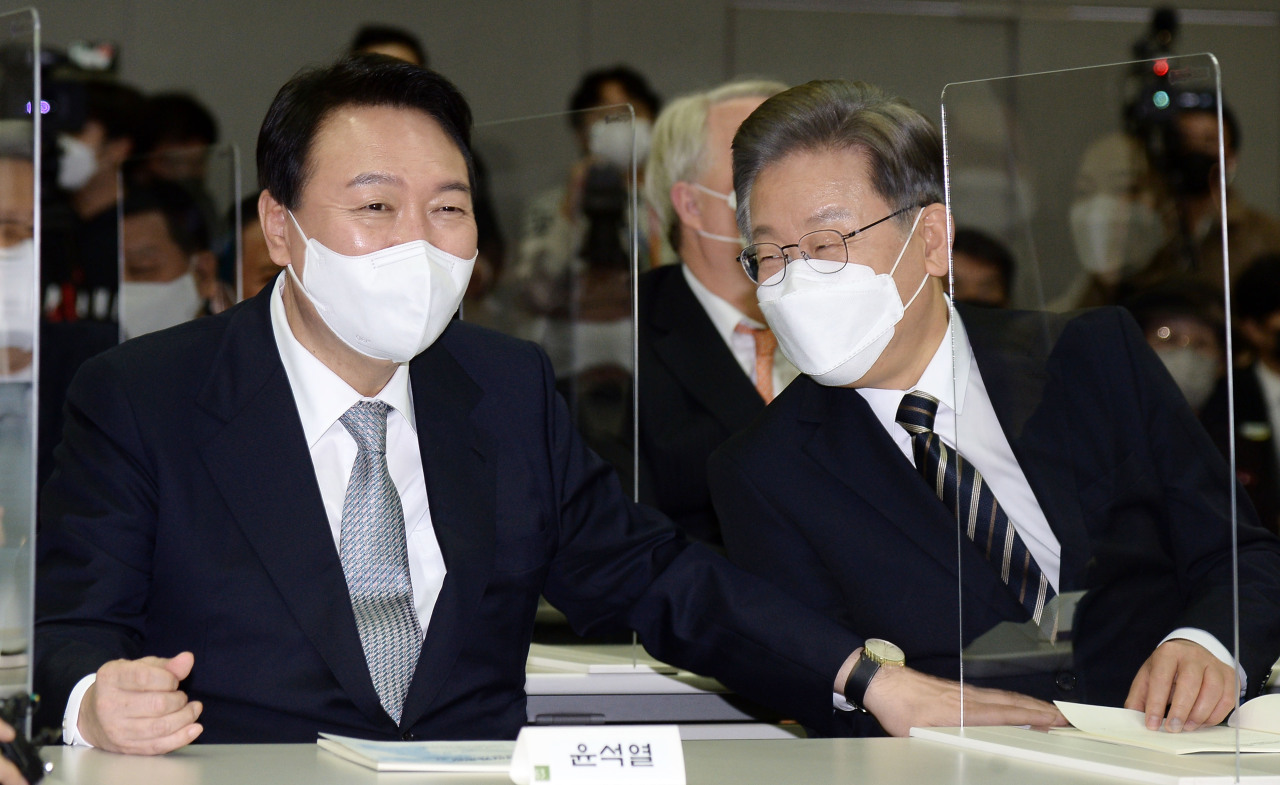 |
Lee Jae-myung (R), the presidential nominee of the ruling Democratic Party, shares a laugh with Yoon Suk-yeol, the nominee of the main opposition People Power Party, at an event in Seoul marking the 21st anniversary of former President Kim Dae-jung's winning of the Nobel Peace Prize, in the Dec. 9, 2021, file photo. (Yonhap) |
The next president, to be elected in March and take office in May, will have a host of urgent issues.
Korea’s economy has been hit hard by the prolonged pandemic. Millions of small business owners and self-employed people are burdened with mounting debts. Housing prices have soared. The deepening US-China rivalry is posing a tricky policy challenge. Relations with the North and with Japan have turned sour.
Whoever becomes a new president, their top priority will, above all, be responding to COVID-19 and the economic recovery, said Seo Jung-kun, a professor at Kyung Hee University’s political science department.
Both Lee and Yoon call for greater support for small business owners and self-employed people, who have been damaged by social restrictions.
The government continues to expand the amount of compensation for losses, but the two candidates say it is not enough. They say up to 100 trillion won ($84 billion) worth of compensation for losses are needed to support the struggling people.
Both are also determined to address the nation’s chronic housing shortages by increasing the supply of houses.
Lee Jae-myung has pledged to come up with “unprecedented housing supply measures that exceed expectations.”
Yoon Suk-yeol has vowed to supply 2 million units in the private sector separately from a government-led 500,000 units.
Regarding foreign policy, they share similar stances on stressing the importance of the Korea-US alliance, reciprocal cooperation with China and restoring relations with Japan.
"The biggest difference in their foreign policy is North Korea and the North’s nuclear weapons," said Shin Beom-chul, director of the Center for Diplomacy and Security at the Korea Research Institute for National Strategy.
"Lee’s side talks about sanctions relief on the premise of a snapback (easing sanctions first and restoring sanctions if promises are not kept). Yoon’s camp talks about phased sanctions relief following North Korea’s practical denuclearization measures," Shin said.
Wi Sung-lac, who chairs the foreign affairs committee of Lee Jae-myung’s presidential campaign, said, "The declaration of the end of the war is one of the peace processes."
Kim Sung-han, who is in charge of diplomatic and security advice at the presidential candidate camp Yoon Suk-yeol, said, “There is a lack of clear explanation why we should do it now.”
If Lee becomes president, he will likely move more preemptively concerning the North Korean issue considering his engagement strategy with North Korea and his diplomatic and security aides, said Professor Seo Jung-kun.
"In the case of Yoon, as a conservative, he is expected to watch the situation of sanctions on North Korea a little more," he said.
"But even for Yoon, he will be pressed to solve the North Korean issue as time passes by and when the economy stabilizes. And, there is a sufficient possibility that he may show a preemptive policy toward North Korea, such as the establishment of a liaison office."
By Shin Ji-hye (
shinjh@heraldcorp.com)








